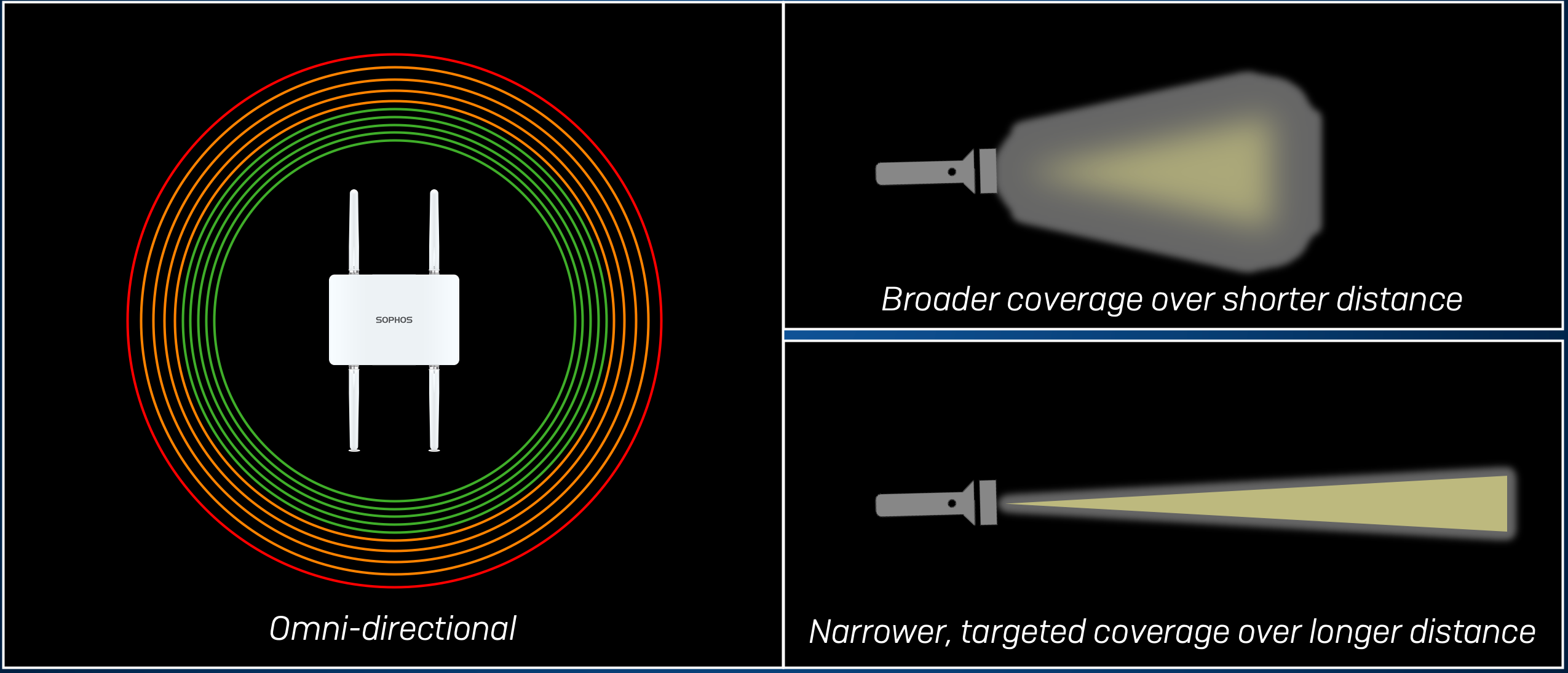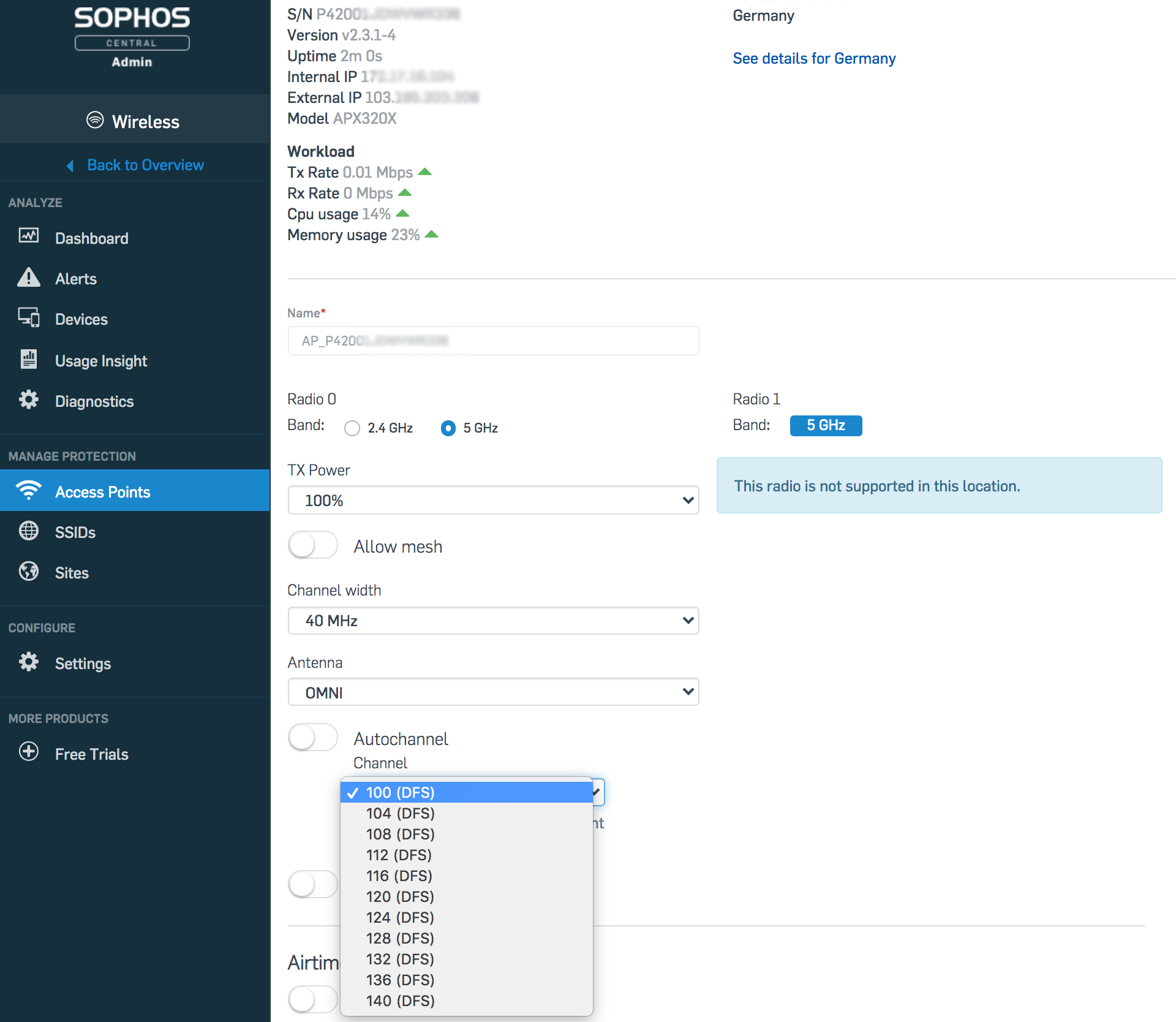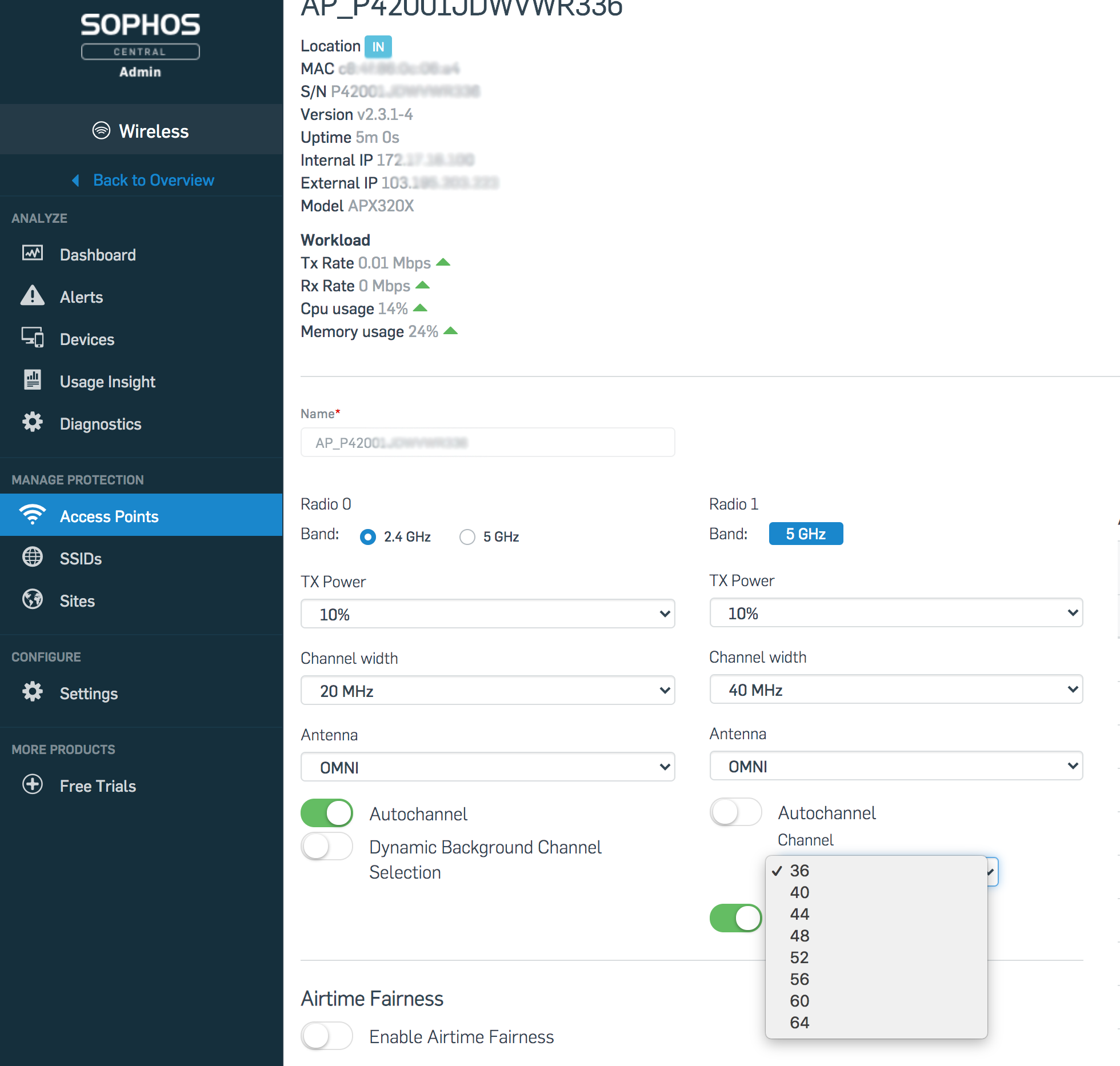The APX 320X outdoor access point will be launching for Sophos Central management in the next few days. Software staging is planned to complete by September 21 and therefore, the first customer shipment will align with that date.
This new model will be supported in Sophos Central only. Any customer using XG or SG UTM can continue to purchase the AP 100X for outdoor use.
There are some important things that you need to understand about regulations in some regions (Europe, ANZ, S. Africa and more) that prohibit the use of some 5 GHz Wi-Fi channels in outdoor environments and so prevent the use of one of the radios (full explanation below).
Product Highlights: APX 320X
The APX 320X is a dual-radio*, 2×2 MIMO device supporting the 802.11ac Wave 2 Wi-Fi standard (Wi-Fi 5). Built upon the same architecture as the APX 320, but with modifications such as a different housing to meet the IP67 rating, withstand a broader temperature range (-40°C/-40°F to 55°C/130°F), plus external antenna options, this model opens up some interesting new usage scenarios in outdoor and more exposed areas.
As with all APX models, it comes with a 5-year warranty and Advance Replacement RMA in combination with the Central Wireless Standard (for APX) subscription.
- 40% lower price than the AP 100X
- DACH/NA pricing: USD/EUR 750 MSRP vs. USD/EUR 1245
- 120° Sector/30° Directional antenna options
- Potential to address new use cases
- Completes the legacy AP replacement line-up
- AP 100X is still available for SG UTM/XG management
Software Support
- Cloud Management:
- Sophos Wireless v2.3.1-4 (Sophos Central)
Antenna Types
For the first time, in addition to the omni-directional antennas supplied with the unit, we are also offering external antenna options to meet the requirements of some new usage scenarios. Both options, which are available for separate purchase, provide focused coverage for a specific area.
As the name suggests, the standard omni-directional antennas are designed to provide relatively even coverage around the unit in all directions. These are suitable for usage scenarios where the connecting clients will be distributed around the access point, but particularly in some outdoor areas, there may be obstructions which can interfere with the signal and cause signal wastage.
The simple way to understand a directional antenna is to compare it with a flashlight on which you can adjust the beam. The standard setting provides a wide beam over a shorter distance (more like the omni-directional antennas). If you select a narrower beam, the light can extend further and is more focused. With directional/sector antennas you achieve targeted, better coverage at an extended range and reduce signal wastage.

The characteristics and typical use cases for each antenna are shown below.
| ANTENNA TYPE | TYPICAL USE CASE | CHARACTERISTICS |
| Omni-directional (default) |
|
|
| 30° Directional Antenna |
|
|
| 120° Sector Antenna |
|
|
Important Information for Europe, ANZ, South Africa and Other Countries
A list of countries where this model will function as a single radio device in outdoor environments is included in this KB Article LIST OF AFFECTED COUNTRIES (note: this list may be extended if we become aware of further countries)
*Single Radio Use Due to Regulatory Restrictions
Short, non-technical explanation:
If you’re in any of the countries listed here, you can only use this model as a single radio device to broadcast EITHER 2.4 GHz OR 5 GHz (on Radio-0). The other radio (Radio-1) will not be available for configuration due to regulatory restrictions. Additionally, in Israel you will only be able to use 2.4 GHz channels as all 5 GHz channels are prohibited for outdoor use.
Detailed Explanation:
This model includes two radios:
- Radio-0: a dual-band radio (Radio-0) which can broadcast either 2.4 GHz or 5 GHz (high band channels)
- Radio-1: a single-band radio for 5 GHz (low band channels only).
The architecture design to support dual 5 GHz mode, means that the lower band 5 GHz channels are broadcast on the single-band radio (Radio-1) and the higher band 5 GHz channels are broadcast on the dual-band radio (Radio-0).
Within the 5 GHz spectrum, channels 100-140 use Dynamic Frequency Selection (DFS) to avoid interference with radars. The regulations in a number of regions stipulate that only DFS channels can be used in outdoor environments where radar activity is more likely to be detected. This means that the single band 5 GHz Radio-1, which can broadcast only the lower band channels, can’t be used in countries where such a regulation exists.
This is what the configuration will look like in Europe, ANZ, South Africa and a number of other regions:

In any country not listed, both radios are available for configuration and the full capability of the APX 320X can be used including dual-band mode (2.4 GHz and 5 GHz simultaneously) and dual 5 GHz mode (5 GHz channels distributed over both radios for better performance in higher density environments (more clients can connect at the same time).
This would be the configuration in countries such as Canada, the USA and any others not affected by the regulations:
 Please also bear in mind that your customers may have locations distributed across multiple countries in which the above restrictions may (or may not) apply.
Please also bear in mind that your customers may have locations distributed across multiple countries in which the above restrictions may (or may not) apply.
Ordering
The APX 320X is already on the current price list for regions where certified. The SKUs will be active for quoting and ordering through your local distributor in time for GA.
Further Information
All sales collateral will be updated and published on the Partner Portal in the coming days leading up to the GA date.
A few items are already available to allow you to familiarize yourself with the product details before launch.
Should you have any questions, please do not hesitate to reach out to your local Sophos contact or distributor.